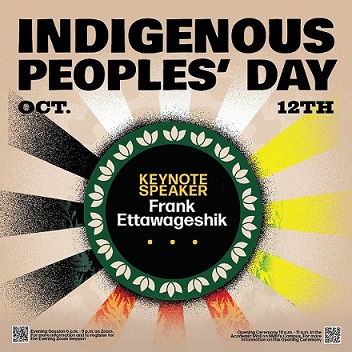The Native American Student Association will host NMU’s first officially recognized Indigenous Peoples’ Day this coming Monday, Oct. 12. The event which was officially recognized in an NMU Board of Trustees meeting in July will host both an in-person morning celebration from 10 a.m. to 11 a.m. and a virtual event over Zoom from 6 p.m. to 9 p.m. Both events will be focused on celebrating what it means to be Indigenous and educating those who might not know the history surrounding the fight for Indigenous peoples’ recognition.
“For myself, the idea of being Indigenous is a newly accepted thing … I always knew we were Native but it is something we never talked about or accepted. That’s one of the things we’re fighting for in Indigenous Peoples’ Day is equal recognition. For myself being Indigenous means being comfortable with yourself and knowing where you come from,” Vice President of NASA Anthony Cergnul said.
The morning celebration will take place at the Academic Mall and begin with a drum ceremony and traditional dancing. Following the opening ceremony, there will be talks from NMU President Fritz Erickson, ASNMU President Emma Drever, Interim Head of the Center for Native American studies Martin Reinhardt and Assistant Professor Jud Sojourn. To register for the morning session click this link or find the event on NMU’s Hub.
The evening celebration will feature keynote speaker Frank Ettawageshik, an elder who has worked as the Tribal Chairman for the Little Traverse Bay Bands of Odawa Indians in Harbor Spring, Michigan for 14 years and has also served as an advisor for many organizations and councils focused on the rights of Indigenous peoples. There will also be a panel discussion featuring student panelist Bazile Panek, faculty panelist Leora Lancaster and community panelist Meska Gekek Kwe. Following the discussion, there will be a virtual performance from music group Waawiyeaa to finish off the evening of celebration. To register for the evening session click this link or find the event on NMU’s Hub.
“The first priority for me is educating and informing my peers. Without others around us being educated and informed about the plight Indigenous peoples endured and the resiliency that we have today there is no celebration. Having people around us know our past and understand our experiences makes a better community for Native students and members in our Marquette community,” Panek said.
The battle to get Indigenous Peoples’ Day recognized has been a long-fought battle, something that professor and interim head of the CNAS Martin Reinhardt explains has been going on since the beginning of the academic institution.
“A Native presence on campus didn’t really start to grow until the late 1960s. In 1968 there were 23 Native higher-ed students and all of them went to Northern. They were true activists fighting for recognition and I think they would be very happy to see that the students and faculty staff have succeeded in recognition for this day and a little disappointed it has taken this long,” Reinhardt said.
Now that NMU has officially recognized the day, Panek said it’s important to appreciate all of the work that the past students and community members have done to pave the way for it to happen.
“I think personally to the elders in this community and at NMU who have contributed to Indigenous Peoples’ Day being recognized. I would first say miigwech, thank you, for the faculty and community for starting the fight, continuing the fight and being there to lay the groundwork for this movement,” Panek said.
Although it has taken years, during last year’s unofficial celebration of Indigenous Peoples’ Day NASA saw an increase in students and community members coming out to show support. This is when Cergnul says he knew that the day of recognition was coming.
“For me last year it really felt like it was going to happen and when we look at when this was recognized we were just getting into entering the time of global pandemic and lockdowns,” Cergnul said. “Even more before that, I think it’s interesting to point out this all happened before the surge in social and racial equity and equality fight that has been going on stemming not only from George Floyd’s death and the Black Lives Matter Movement but various other things happening in the world. I find it very fitting that of any time when racial equality has been the hardest fought in our modern times that this day would be recognized is really unique and very fitting.”
With the day officially recognized by the university, the next step for NASA according to Panek is to create events that educate students and community members on the Anishinaabe culture and history.
“Just being exposed to these issues and being able to take away that this is a thing is the recognition we’ve been fighting for so long that’s one of the vital steps we need to take. Getting away from the stereotypes that Hollywood perpetuated that Indians just live in the trees and teepees and we don’t really exist anymore. The most important thing for me is the recognition that Indigenous peoples are still here and this is our home,” Cergnul said.





























